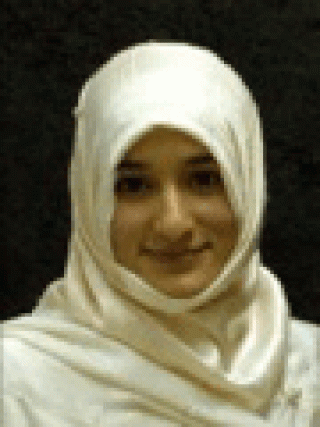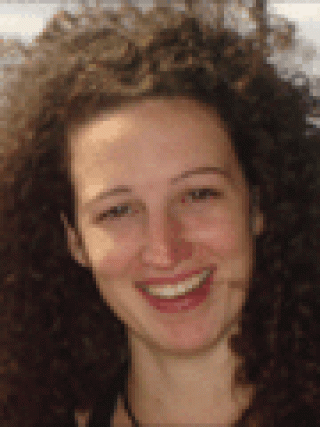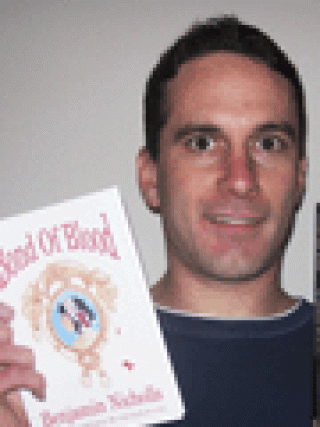Speaking a number of different languages gives you the intercultural skills you need in today's global world.
Studying an alternative language, like Dutch, means you can learn a new language from scratch and get an insight into a culture not many people know much about. This means you will not only stand out on the job market, but you will also have something really valuable to offer when you graduate.
- Terry Ezra (BA Dutch)

Terry Ezra
BA Dutch
Cultural entrepreneur, translator,
MA student Arts Administration & Cultural PolicyWhy did you choose to study Dutch Studies in general and at UCL in specific?
UCL was the only place in the UK where I could pursue a university degree entirely dedicated to the language and culture of the Netherlands and Flanders.
What did you like most about your degree programme?
The breadth of approaches to understanding the Netherlands and (Flemish) Belgium - which was also one of the most challenging aspects.
What was it like being a student at the Dutch department?
Staff are friendly and approachable.
How has your degree been of benefit to you since you took your degree?
It was always my intention to emigrate to the Netherlands and I wouldn't have had the courage to do that without the foundation that this degree gave me. In many respects I know more about the Netherlands than a lot of Dutch people. The course also enabled me to reflect on many aspects of British culture which I hadn't done before and I am now engaged with social and political questions which I could not have foreseen. On a more mundane level, the fact that you have studied Dutch to degree level draws attention; I'm sure that I've been offered jobs simply because it was intriguing to have a Dutch-speaking Englishman around. Currently, I'm involved in promoting co-operative projects between Dutch and English theatre practioners, I'm pursuing a masters degree in Arts Administration and Cultural Policy, and my second translation of a Dutch play has also received a professional production, with more translation commissions to follow.
- Safina Khatun (BA Dutch and Management Studies)

Safina Khatun
BA Dutch and Management Studies
Teacher of Business StudiesWhy did you choose to study Dutch Studies in general and at UCL in specific?
UCL offered a unique opportunity to combine my interest in Dutch and Business Management.
What did you like most about your degree programme?
The range of courses available in the Dutch Department and the Management Studies Department were both exceptional and engaging.
What was it like being a student at the Dutch department?
The support I received from the staff in the Dutch department was magnanimous. The lecturers are some of the most inspiring and generous people I have ever met. It has been a privilege to have them contribute to my education.
How has your degree been of benefit to you since you took your degree?
Learning Dutch has equipped me with the tools necessary to carry out a project I am presently involved in. I am translating a Dutch Maths Syllabus for an educational charity that is very close to my heart. The Management aspect of my degree has enabled me to transmit my enthusiasm for the subject to future entrepreneurs.
- Lorin D'Costa (BA Dutch and Management Studies)

Lorin D'Costa
BA Dutch and Management Studies
professional chess player/teacherWhy did you choose to study Dutch in general and at UCL in specific?
My mother is Belgian, and had always wished to be able to speak Dutch with my family there. Of course most of them could speak English, but I found that I was able to learn so much more about my family and their culture purely because they could narrate to me in their own language.
What did you like most about your degree programme?
The intensiveness. At school, for both GCSE and A-level, language learning sometimes appeared a bit slow and stilted. At university, the emphasis is on learning quickly and tackling the language head on from the beginning.
What was it like being a student at the Dutch department?
I found it to be very enjoyable. The courses utilised a whole variety of methods, and the Dutch department has a large annex in the UCL main library so students are never short of materials to use. Being a relatively small department, each student gets to know the others very well over the course of the 4 year degree and because they all have the same goal (to learn Dutch!) it is more advantageous for language development than being in a very large department.
How has your degree been of benefit to you since you took your degree?
My personal aim from studying Dutch was due to family reasons (point 1) and in this respect, it has been an unqualified success. Also, I have been able to play for a Dutch chess team (schaakteam utrecht, http://www.jeugdteam.nl/) and practice frequently with Dutch friends from there and also from my erasmus year abroad. Finally, I'm considering getting a job in Belgium/Holland in the future where the language would come in very useful.
Anything else you want to add about your experience at UCL or your career since leaving UCL?
Studying Dutch at UCL in London has many advantages, as London is such a diverse, metropolitan city that one can take a look at the Dutch influence in London which wouldn't be possible if studying at a smaller university in a suburban area.
- Milena Müller (BA European Studies with Dutch)
Milena Müller
BA European Social and Political Studies (Dutch pathway)
StudentWhy did you choose to study Dutch in general and at UCL in specific?
UCL offered me the unique opportunity to combine a social science degree with the study of a European language. Having lived close to the Dutch border in Germany for many years, it was an obvious choice to study the language of my neighbours.
What did you like most about your degree programme?
The year abroad was one of the best experiences of my degree programme. I really enjoyed studying and working in the Netherlands. It was great to put the language skills that I had acquired during my first two years at UCL into practice.
What was it like being a student at the Dutch department?
I really enjoyed being a student at the UCL Dutch department. The greatest benefit of the Dutch department is its relatively small size. Everyone knows everyone; people care about each other. Especially the level of support that was offered to students was unmatched.
How has your degree been of benefit to you since you took your degree?
It was a great experience to see that Dutch can be an international language of communication. Last year I undertook a project with a Chinese student who had lived in the Netherlands for many years. We immediately started to communicate in Dutch!
Anything else you want to add about your experience at UCL or your career since leaving UCL?
Studying at UCL was fantastic! I usually still come back and visit UCL when I am in London.
- Elena Kostova (Affiliate Student)

Elena Kostova
Affiliate Student (Erasmus)
Assistant Artist ManagerWhy did you choose UCL for your studies?
Known as one of the best colleges in the UK, I primarily chose for UCL because of its central position in the English capital and also because of the outstanding reputation that it's Dutch faculty has in the Netherlands as being the best and the biggest Dutch study programme in the English speaking world.
What did you like most about your degree programme?
The possibility to follow my own path and freedom to design my own curriculum which suited my interests.
What was it like being a student at UCL?
Studying at UCL was a life enriching experience. The Department of Dutch is a relatively small faculty which offers plenty of opportunity for students and teachers to interact on a daily basis not only through the lectures, but also through the extra curricular activities. During the Weekly coffee ours (koffie-uurtjes) students across the faculty had a chance to meet and socialize with the faculty stuff and the affiliate students. Also, occasionally we had theme evenings whereby we would have an opportunity to view a Dutch film or go to the famous Dutch cafe Hems in China Town.
How has your degree been of benefit to you since you took your degree?
The beauty and the advantage of having spent an academic year at the Department of Dutch was the possibility not only to master a new language but also to socially and culturally expand my horizons. Also, the knowledge of Dutch language and culture has proven to be an asset in my current job. As I currently work at an International Agency for classical music and the Netherlands and Flanders are very important territory with the rich classical music life and plenty of venues and world renowned orchestra's I am considered by my colleagues as a cultural broker, somebody who is not only able to understand what people on the other side of the canal say but more importantly what they really mean.
Anything else you want to add about your experience at UCL or your career since leaving UCL?
I would warmly recommend to anybody who wishes to study in the heart of London in an intimate and intellectually stimulating and challenging environment to visit the faculty of Dutch and get the first hand experience.
- Benjamin Nicholls (BA Dutch)

Benjamin Nicholls
BA Dutch
AuthorWhy did you choose to study Dutch Studies in general and at UCL in specific?
I wanted to learn Dutch properly because my mum is half Dutch and I still have regular contact with my family in the Netherlands. I chose UCL because I wanted to see what it was like living in London.
What did you like most about your degree programme?
The year abroad. It was great to live in the fantastic city of Antwerpen.
What was it like being a student at the Dutch department?
Being a student in the Dutch Department is to be part of a truly gezellige sfeer. Because it is a small department, it is easy to meet and get to know other students and the lecturers. I felt that there was a comfortable balance between respect and familiarity in the relationship between the professors, lecturers and students.
How has your degree been of benefit to you since you took your degree?
4Quite simply it has meant that I can have conversations with the youngest and eldest generations in my family who either cannot speak English or have not yet learnt it. For that reason alone (as well as others), my degree was worth every minute and every penny.
Anything else you want to add about your experience at UCL or your career since leaving UCL?
It was during my time at the Dutch Department that I began to research my family tree. This has led to me writing and publishing two novels on that subject, with more to come as part of a series. I am grateful to the Tessa de Loo who was the Writer-in-Residence at the Dutch Department in my first year for reading some of my work and offering me advice and encouragement.
- Will Kelly (BA Dutch and German)

Will Kelly
BA Dutch and German
Freelance TranslatorWhy did you choose to study Dutch in general and at UCL in specific?
I had lived in the Netherlands as a child and wanted to study the language. UCL appealed as it was a prestigious university in a city that presented many interesting opportunities for a young student.
What did you like most about your degree programme?
The department was very friendly and supportive.
What was it like being a student at the Dutch department?
Everybody knew everybody and the staff were great.
How has your degree been of benefit to you since you took your degree?
Due to my language skills, I was headhunted for various positions in business. I also went on to study a Masters at the Universiteit Leiden, for which I earned a distinction. I have since become a freelance translator (Dutch>English) and have recently finished translating a book on the tensions that exist between politics, law and literature, the theories in which were 'tested' in the poetry of Joost van den Vondel (I also had to translate a lot of poetry). The book is entitled 'Vondel belicht: voorstellingen van soevereiniteit' in the original Dutch, and will be called 'Sovereignty, Inviolability & the Dutch Golden Age Poet Joost van den Vondel'. It is to be published by a world-leading academic publishing house late 2008.
Anything else you want to add about your experience at UCL or your career since leaving UCL?
Having UCL on my CV has been a great stepping stone in my career so far. I have very fond memories of the department and hope my work or study will cause us to cross paths again!
- Neil Halpin (BA Dutch and German)
Neil Halpin
BA Dutch and German
Technical Account Manager, Yahoo!Why did you choose to study Dutch Studies in general and at UCL in specific?
I had previously visited the Netherlands on numerous occasions and had developed an interest in both the country and the language. Having studied German at school for years, I was interested in combining I was also interested in combining German with another language, and thought Dutch would be a good choice. UCL was one of the few universities which offered a 50/50 degree combining both.
What did you like most about your degree programme?
I liked the fact that my studies were not only language-related, but encompassed other areas too, such as literature, linguistics and social history.
What was it like being a student at the Dutch department?
I always enjoyed my time at the Dutch department, which was much smaller and intimate than many others at UCL. There was a lot of flexibility and due to the relatively high staff-student ratio, it was always easy to approach the lecturers.
How has your degree been of benefit to you since you took your degree?
When I graduated, I thought: what now. I did an EFL course and lived in Germany for a few years, where I taught English, before retuning to London. It turned out that Yahoo! was looking for a Dutch speaker to join a team in their search marketing department, so that their sales staff in Amsterdam could be supported. For two years, I spoke Dutch on a daily basis. I then moved to a more pan-Euro role with Yahoo! and continue to work directly with some of the largest Dutch advertisers, though I now also use my German regularly too. Additionally, I managed, with great ease, to learn Spanish some years back, using many of the learning techniques I'd picked up at UCL. I never really expected Dutch to feature particularly in my post-university career. How wrong I was!
Anything else you want to add about your experience at UCL or your career since leaving UCL?
I really enjoyed my time at UCL and my year abroad at the Vrije Universiteit in Amsterdam and the Universität Hamburg; I would whole-heartedly recommend a combined Dutch/German degree at UCL to anyone.
- Chris Shephard (BA Dutch with Management Studies)
Chris Shephard
BA Dutch with Management Studies
Business Park Co-ordinator/BID Project Manager, Arun District CouncilWhy did you choose to study Dutch in general and at UCL in specific?
Because studying Dutch sounded exciting and a fresh challenge from French & German. I was also keen on a year abroad to broaden my horizons. Naturally UCL was first choice for me because of its history, approach to the world and civilisation and its location.
What did you like most about your degree programme?
A major (in Dutch) and minor (in Management Studies) mix kept things interesting. I also don't think I've ever been so challenged academically!
What was it like being a student at the Dutch department?
Excellent, because it was like a family. Our small class knew everyone and got to know each other well. It was also very relaxed, but help was on hand whenever you wanted it.
How has your degree been of benefit to you since you took your degree?
My degree in general has helped me become a project manager. I find the way I approach situations and communicate with people helps me a great deal, skills which I put down to going to UCL and studying the degree I did. I spend a lot of time with businesses and business people, so having a broad range of skills can really help gain their trust and build a reputation. Revealing that you can speak Dutch can be a good topic of conversation at networking evenings too! I also use my Dutch knowledge in different situations, which can surprise people! For example, my girlfriend runs her own greetings card business which specialises in carriage driving images. We were selling her work at the South Of England Carriage Driving Fair where we had a stall, and this Dutch couple came up and were talking to each other in Dutch. "Ik vind het leuk" the man said about Helen's cards. I knew what he was on about, and we sold quite a few not least because of my chit chat with them, in Dutch of course!
Anything else you want to add about your experience at UCL or your career since leaving UCL?
It was certainly one of the best times of my life, where I learnt a lot. I still keep in touch with a lot of my friends and go back from time to time. I contribute to the UCL Friends Programme so that future students can benefit from grants etc just as I did, which enabled me to finish my degree.
Where can it take me?
You can find more student testimonials and videos on life in the department on the UCL Alternative Languages website.
 Close
Close

